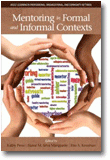
Mentoring in Formal and Informal Contexts
Edited by:
Kathy Peno, University of Rhode Island
Elaine M. Silva Mangiante, Salve Regina University
Rita A. Kenahan, DePuy Synthes Institute
A volume in the series: Adult Learning in Professional, Organizational, and Community Settings. Editor(s): Carrie J. Boden, Texas State University.
Published 2016
Mentoring in Formal and Informal Contexts is a collection of invited works on mentoring in the many contexts in which it exists. Working with AHEA, the editors identified authors that have demonstrated experience and/or have published in this area. The book is arranged thematically (health care, education, the workplace, etc.) and further sub-themed as appropriate. Mentoring in Formal and Informal Contexts is important because it fills a unique niche in the field of adult education, extends the scope of AHEA to a larger audience, and offers a current volume for scholars and practitioners based on both research and practice-based research. The audience: This collection is appropriate for a wide variety of professors, researchers, practitioners, and students in the field of adult education.
CONTENTS
Preface, Thomas D. Cox. Foreword, Stuart E. Dreyfus. Acknowledgments. Introduction, Kathy Peno, Elaine Silva Mangiante, and Rita Kenahan. Bridging Formal and Informal Mentoring: A Developmental Network Perspective, Dawn E. Chandler, Wendy M. Murphy, Kathy E. Kram, and Monica C. Higgins. PART I: MENTORING IN HIGHER EDUCATION, Academic Mentoring as Precarious Practice, Alan Mandell and Xenia Coulter. Multi-Dimensional Model for Mentoring Faculty: A College-Wide Approach, Lori E. Ciccomascolo and Anne M. Seitsinger. Three Ds on Mentoring: Different Experiences, Different Stages, and Different Disciplines, Amy L. Sedivy-Benton, Nancy Feyl Chavkin, and Carrie J. Boden-McGill. Facilitating the Doctoral Mentoring Process in Online Learning Environments, Kathleen P. King. Developing Supportive Mentoring Models for Graduate Education, Catherine A. Hansman. Leadership that Lasts a Lifetime: Collegiate Advising as Mentoring in a Black Greek Letter Organization, Sean Dickerson, Vonzell Agosto, Maniphone Dickerson, and Michael Dove. She’s Younger Than Me: A New Look at Age and Mentoring in Doctoral Education, Geleana Drew Alston. PART II: MENTORING IN K–12 TEACHER EDUCATION, Perspectives from Field-Based and University Clinical Educators’ Implementation of Induction Mentoring Strategies with Pre-Service Teachers, Elaine M. Silva Mangiante and Elizabeth McAuliffe. Improving Special Education Teacher Candidate Collaboration with Families through Mentorship, Adam Moore and Catherine Semnoski. Clinical Educators’ Implementation of a Mentoring Model: Coaching Elementary Pre-Service Teachers for Reform-Based Science, Elaine M. Silva Mangiante and Kathy Peno. PART III: MENTORING IN HEALTHCARE, Mentorship in Academic Medicine, Shadi Aminololama-Shakeri and Andreea L. Seritan. The Influence of Mentors and Role Models on Teaching and Learning in Academic Medicine, Teresa J Carter, Ellen L. Brock, Frank A. Fulco, Adam M. Garber, Reena H. Hemrajani, Bennett B. Lee, Scott C. Matherly, Emily R. Miller, and John G. Pierce, Jr. Informal Mentoring in Nursing, Theresa Criscitelli. PART IV: MENTORING IN MULTIPLE CONTEXTS, Developing Future Technology Executives at Columbia University using Formal and Informal Mentoring Methods, Arthur M. Langer. Sisters Without Borders: Collaborative Mentoring for Social and Personal Well-Being and Transformation, Rita Kenahan, Rosie Lim-Williams, Maria Liu Wong, Naya Mondo, Aimee Tiu-Wu, and Connie Watson.
-
Paperback9781681234618
Web price: $45.04 (Reg. 52.99)
-
Hardcover9781681234625
Web price: $80.74 (Reg. 94.99)
- eBook9781681234632

- EDU037000 - EDUCATION: Research
- EDU002000 - EDUCATION: Adult & Continuing Education
- EDU059000 - EDUCATION: Teacher & Student Mentoring
-
 A Guide to College Success for Post-traditional Students
2nd Edition
A Guide to College Success for Post-traditional Students
2nd Edition
-
 Advancing the Global Agenda for Human Rights, Vulnerable Populations, and Environmental Sustainability
Advancing the Global Agenda for Human Rights, Vulnerable Populations, and Environmental Sustainability
-
 Leaps of Faith
Stories from Working-Class Scholars
Leaps of Faith
Stories from Working-Class Scholars
-
 Teaching and Learning for Adult Skill Acquisition
Applying the Dreyfus and Dreyfus Model in Different Fields
Teaching and Learning for Adult Skill Acquisition
Applying the Dreyfus and Dreyfus Model in Different Fields
-
 Transformative Learning in Healthcare and Helping Professions Education
Building Resilient Professional Identities
Transformative Learning in Healthcare and Helping Professions Education
Building Resilient Professional Identities
-
 Trauma in Adult and Higher Education
Conversations and Critical Reflections
Trauma in Adult and Higher Education
Conversations and Critical Reflections
-
 Unfinished Business
Compelling Stories of Adult Student Persistence
Unfinished Business
Compelling Stories of Adult Student Persistence

